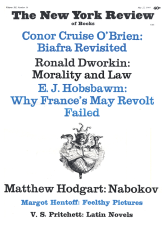In response to:
The Hero City from the April 10, 1969 issue
To the Editors:
I should like to comment on A. J. P. Taylor’s defense of Stalin’s wartime leadership. It was, indeed, as Mr. Taylor says, “very hard.” But it was much more than that. It was capricious, often incredibly misdirected and never free from Stalinesque paranoia, “sickly suspicion,” as Khrushchev called it.
Mr. Taylor exculpates Stalin for the Leningrad disaster. I do not. Stalin’s commanders, General Kuznetsov of the Baltic Military district among them, were in the process of taking intelligent, urgent steps to put—belatedly—their defenses in order in the days just before Hitler attacked on June 22, 1941. Stalin, acting through Zhukov (possibly at Beria’s behest), violently and arbitrarily countermanded the orders.
The terror of the purge (which was still going on in the armed forces on the very eve of the war) was so great that no commander was prepared to stand up and argue for what he knew to be common sense—that Hitler was about to attack. One of the first steps taken in Leningrad (within twenty-four hours of the Nazi attack) was to order the mobilization of civilians to work on fortifications. But the political leadership of Leningrad refused to take responsibility for so sensitive a step. The question was still dangling when Zhdanov returned from his ill-timed vacation on June 27. After much argument he refused to authorize the order on his own responsibility but ultimately was persuaded to telephone Stalin who was equally reluctant but finally gave his permission. It would appear that the sensitivity to “volunteer” work related to charges involved in the purge of the Red Army in which some of the Generals were accused of setting up “guerilla units” for use in a plot against Stalin.
The paralyzing influence of Stalin’s terror was the direct cause of the Kiev disaster in early autumn when Kirponos and the whole Southwest Front command, together with three quarters of a million men, were lost because they preferred to carry out fatally misguided orders (which they agreed would lead only to catastrophe) rather than argue the case with Stalin.
Who ordered the guns and equipment removed from the “old” fortifications system north of Leningrad and to the west and southwest after the Finnish “winter war” and the absorption of the Baltic states into the Soviet Union in 1939-40? Stalin. The existing fortifications system was dismantled before the massive new works in the new frontier regions had been completed. Indeed, the frontier works were far from complete when war started in addition to being badly designed. The work was in Beria’s hands and dawdled along unconscionably.
Who was responsible for the fantastic miscalculations of the Soviet winter offensives of 1941-42 in which the Red Army, so savagely mauled in the summer and fall fighting that it was still staggering, was compelled to waste its modest strength in a whole series of broadscale operations which Stalin thought would actually defeat the Germans and push them back into their own country? This was Stalin, the great war leader! Who insisted on the fatefully misguided dispositions of spring-summer 1942 and the disasterous Kharkov offensive which led directly to the German drive on Stalingrad? Stalin, of course—over the muted objections of some of his generals.
To compare Stalin with Roosevelt and the Nazi attack of June 22 with Pearl Harbor is a fantastic underestimate of Stalin’s blunder. Roosevelt knew the Japanese were about to attack. What he did not know (because of the delay in decoding and delivery of the Japanese messages) was that Pearl Harbor as well as Southeast Asia was to be a target. Stalin, on the other hand, blindly and fanatically refused to believe Hitler was going to attack and even after the Nazi assault began still refused to believe that Hitler had ordered the offensive.
As for Stalin’s attitude toward Leningrad I do not think anyone who reads Admiral Kuznetsov’s account of his talk with Stalin about the destruction of the northern capital will be in much doubt of Stalin’s willingness to sacrifice Leningrad to save Moscow. It is true that he had sent his incompetent crony, Voroshilov, to Leningrad to direct the city’s defense—a questionable blessing and one which probably was designed more to have someone there to keep an eye on Zhdanov than a burning desire to protect the city. The mission of Malenkov, Molotov and Co., to Leningrad in late August-early September, 1941 was hardly lacking in political motivation. I am puzzled at Mr. Taylor’s suggestion that British archives are more difficult to get at than the Russian. So far as I know no London museums were closed down in the post-war years; no museum directors were sent into exile (in Scotland?); no survivor’s diaries were whisked off to the safes of MI-5; no novels were suppressed; no poets jailed. If what happened to the Leningrad siege after the “Leningrad Affair” of 1948 does not resemble Orwell’s memory hole more closely than the official British policy on war records I should be greatly surprised.
Mr. Taylor says that the “hero city of Leningrad” got more postwar fanfare than any other in Russia. What about Stalingrad?
Harrison E. Salisbury
New York City
This Issue
May 22, 1969



